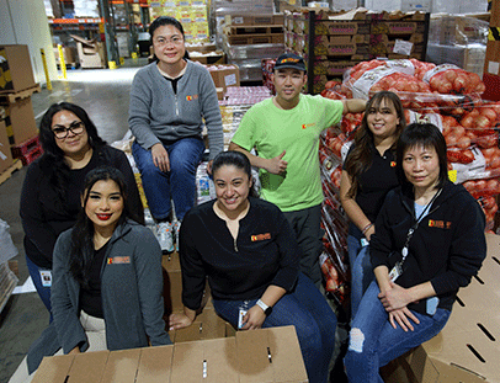
REACH Ashland Youth Center volunteers and staff (left to right): Louisa, Santi, Kieu, and Willy,
Santi Soumpholphakdy is originally from Laos. His family immigrated to the U.S. as political refugees and settled in Utah where their sponsors lived. Life was hard not speaking the language and living in a predominantly white community. “It was difficult to navigate,” he said. “I wish I had access to a youth center where I could have gotten support and explored my creativity.”
Flash forward several decades, and Santi is a licensed clinical social worker working at REACH Ashland Youth Center, an ACCFB partner organization. There, youth aged 11-24 have access to program areas that spell out the organization’s name: recreation, education, arts, career, and health and wellness. Santi heads up the health and wellness programming, which includes a Food Bank distribution twice a month.
 The food distribution attracts families from Ashland, an unincorporated area of Alameda County that lacks the resources of nearby cities and is a food desert. The food distribution is a magnet, and as community members receive food, they learn about all the other services REACH can provide for their kids, grandkids, nieces, and nephews.
The food distribution attracts families from Ashland, an unincorporated area of Alameda County that lacks the resources of nearby cities and is a food desert. The food distribution is a magnet, and as community members receive food, they learn about all the other services REACH can provide for their kids, grandkids, nieces, and nephews.
Karina Campos is a client with three young children under 10. She says they love the fruit in the summer and ingredients for warm soup in the winter. For her family, the food distribution has been a lifesaver. “When I first came to this country, I didn’t have work and didn’t know what to do. There wasn’t enough food for my family or just generally in the community. We would go hungry, but because of the Food Bank, people can come here to get food.”
Food is the foundation not only for health and wellness, but for all of REACH’s programming. Santi and his team of mental health clinicians provide counseling, school advocacy, and empowerment groups. This lays the groundwork for youth to develop their leadership, explore career options, or take up a creative hobby at REACH.
 “I see food as essential to Maslow’s hierarchy of needs,” said Santi. “If I am seeing a client for mental health, how can I expect them to have insight and be reflective if their basic needs like food and housing aren’t met?”
“I see food as essential to Maslow’s hierarchy of needs,” said Santi. “If I am seeing a client for mental health, how can I expect them to have insight and be reflective if their basic needs like food and housing aren’t met?”
REACH’s food distribution is focused on client choice and includes fresh produce, rice, beans, milk, and eggs. It’s a valuable resource to the community to offset the high cost of food in the grocery store. REACH also provides snacks and light lunches for youth so they have energy and can focus on the world of programs available at the agency.




